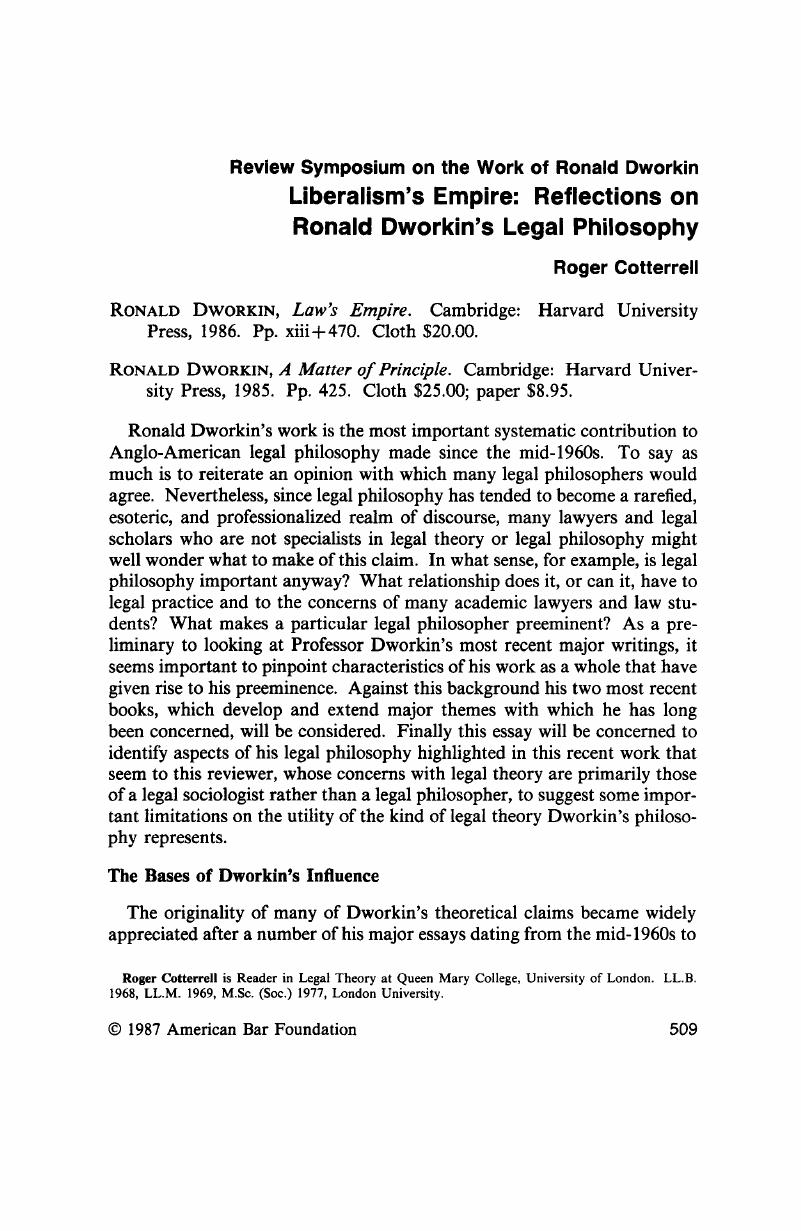No CrossRef data available.
Published online by Cambridge University Press: 20 November 2018

1 See, e.g., several of the papers in Marshall Cohen, ed., Ronald Dworkin and Contemporary Jurisprudence (London: Duckworth, 1984; Totowa, N.J.: Rowman & Allanheld, 1983).Google Scholar
2 See esp. Dworkin, Taking Rights Seriously ch. 4 (expanded ed. London: Duckworth, 1978; Cambridge: Harvard University Press, 1978).Google Scholar
3 This position follows from the typical positivist claim that law is distinguishable from “nonlaw” by certain conventional tests (e.g., for establishing the identity of judicial precedents or legislative provisions) applied in, or presupposed by, legal and judicial practice. Hence, on this view, where no preexisting law governing a particular case is discoverable by applying such tests, a judge must reach a decision in that case by means other than the application of law. Such a judge may thereby create new law if certain contents of the decision are recognizable as law by applying the relevant conventional tests.Google Scholar
4 Brown v. Board of Education, 347 US. 483 (1954); implementation decision, 349 US. 294 (1955).Google Scholar
5 Thus the jural postulates are typically presented in canonical form as the generally unambiguous and uncontroversial products of legal tradition as affirmed by professional (especially judicial) practice.Google Scholar
6 Roger Cotterrell, The Sociology of Law: An Introduction ch. 5 (London: Butterworths, 1984).Google Scholar
7 Cf. P. S. Atiyah, Pragmatism and Theory in English Law (London: Stevens, 1987).Google Scholar
8 Dworkin now sees one major task of the philosopher as being to go beyond these immanent moral and political structures of the law to elaborate how, for example, conceptions of justice (in Dworkin's definition) might be elaborated throughout the law on the basis of uniformity of principle, if existing institutional constraints of law (which also have fundamental moral dimensions) such as precedent, the doctrine of legislative supremacy, established doctrinal classifications, and limitations on the pace or methods of legal change did not operate. Such speculative ventures, which Dworkin seems to recommend but which do not apparently in his view depend for their utility on any sociological study of the actual possibilities of fundamental restructuring of a legal system, are perhaps rightly referred to by him as law's “dreams”. See LE at 400–413.Google Scholar
9 Dworkin, Taking Rights Seriously 7 (cited in note 2).Google Scholar
10 Griffiths, Cf. John, Legal Reasoning from the External and Internal Perspectives, 53 N.Y.U.L. Rev. 1124 (1978).Google Scholar
11 Karl Llewellyn, The Common Law Tradition: Deciding Appeals (Boston: Little, Brown, 1960).Google Scholar
12 Dworkin comes near to admitting this possiblility when he asserts that conventionalism “becomes pragmatism in any case hard enough to come before an appellate court.” LE at 264.Google Scholar
13 Cotterrell, Roger, English Conceptions of the Role of Theory in Legal Analysis, 46 Modern L. Rev. 681 (1983).CrossRefGoogle Scholar
14 Cotterrell, Roger, Law and Sociology: Notes on the Constitution and Confrontations of Disciplines, 13 J. L. & Soc'y 9 (1986).CrossRefGoogle Scholar
15 See Fish, Stanley, Working on the Chain Gang: Interpretation in Law and Literature, 60 Tex. L. Rev. 551 (1982); Fish, Wrong Again, 62 Tex. L. Rev. 299 (1983). For an interesting attempt to reconcile some aspects of Dworkin's and Fish's positions, see Schelly, Judith M., Interpretation in Law: The Dworkin-Fish Debate (or Soccer Amongst the Gahuka-Gama), 73 Calif. L. Rev. 158 (1985).Google Scholar
16 His brief dismissal of the idea of interpretive communities in LE at 425–6 suggests that he is not interested in exploring the actual empirical conditions under which such communities can exist and under which consensus and shared understandings can be maintained or threatened within them.Google Scholar
17 Fish, Cf., 60 Tex. L. Rev. at 565–66; Fish, , 62 Tex. L. Rev. at 309.Google Scholar
18 Cf. Holmes, O. W. Jr., The Path of the Law, 10 Ham. L. Rev. 457 (1897).Google Scholar